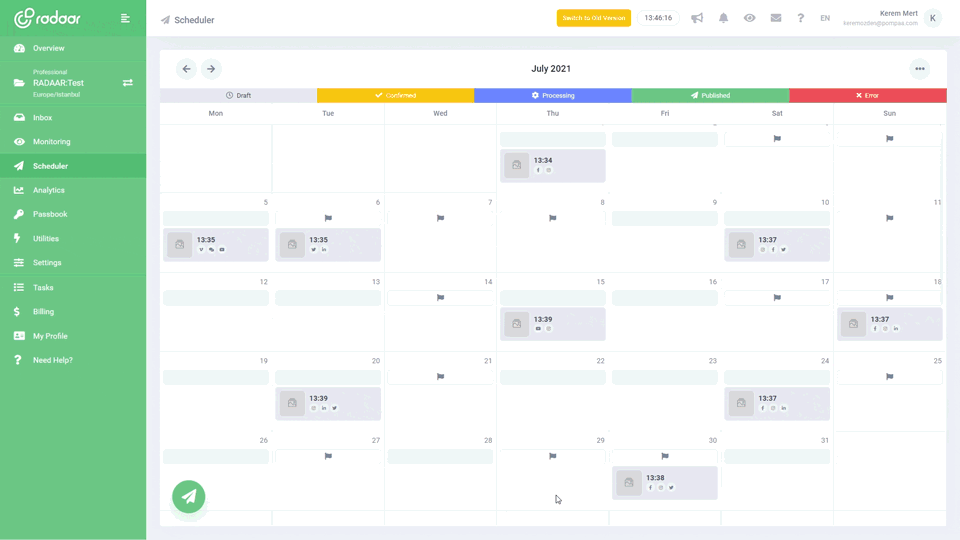How can social media enhance market research to understand guest preferences better?
Unlock the potential of social media to revolutionize your market research strategies and gain deeper insights into guest preferences, helping you craft experiences and products that truly resonate. Dive into our latest blog post to discover innovative techniques and proven tactics for leveraging these digital platforms to their fullest.
LEARN MORE LAUNCH DEMO NOW In today's digital age, social media has revolutionized the way businesses approach market research by providing an unprecedented window into consumer preferences and behaviors. Unlike traditional research methods, which can often be time-consuming and limited in scope, social media platforms offer real-time insights into what customers truly want and value. As users continue to share their thoughts, opinions, and experiences freely online, savvy businesses have the unique opportunity to analyze this wealth of data to fine-tune their marketing strategies and better cater to their audience's needs. From tracking trending topics to gauging satisfaction through customer feedback, social media serves as a dynamic tool for businesses eager to keep their finger on the pulse of market trends.
Moreover, platforms like Facebook, Instagram, and Twitter allow companies to directly engage with their audience, creating a dialogue that can further illuminate consumer preferences. Through various means such as polls, surveys, and interactive content, businesses can effectively gather feedback and adjust their offerings accordingly. This direct interaction not only helps companies personalize their services but also builds brand loyalty as customers feel heard and valued. As brands harness social media's capabilities to enhance their understanding of guest preferences, they position themselves to deliver superior products and experiences, staying ahead in today's competitive marketplace.
Moreover, platforms like Facebook, Instagram, and Twitter allow companies to directly engage with their audience, creating a dialogue that can further illuminate consumer preferences. Through various means such as polls, surveys, and interactive content, businesses can effectively gather feedback and adjust their offerings accordingly. This direct interaction not only helps companies personalize their services but also builds brand loyalty as customers feel heard and valued. As brands harness social media's capabilities to enhance their understanding of guest preferences, they position themselves to deliver superior products and experiences, staying ahead in today's competitive marketplace.
Table of Contents
- Why is social media a crucial tool for market research?
- How is guest preference data collected on social media?
- What role does guest interaction play on social media?
- How does the data aid in shaping guest services?
- What are some challenges faced in this process?
- How can these challenges be overcome effectively?
- What benefits have businesses seen from this strategy?
- How does the future look for social media market research?
- Why is understanding guest preferences through social media market research invaluable?
Why is social media a crucial tool for market research?
In today's digital age, social media has become a crucial tool for market research because it offers real-time insights into consumer preferences and behaviors. By analyzing interactions and feedback across various platforms, businesses can tap into a wealth of authentic user-generated content that highlights what guests truly think and feel about their products or services. Moreover, social media allows brands to engage directly with customers, fostering a two-way conversation that can reveal deeper insights than traditional surveys. This wealth of data helps companies make informed decisions, tailor their offerings, and ultimately enhance guest satisfaction and loyalty.
How is guest preference data collected on social media?
Guest preference data on social media is collected through a variety of engaging and insightful methods. Businesses often monitor comments, likes, and shares to gauge what resonates with their audience, which gives a clear picture of guest preferences in real time. Moreover, utilizing social listening tools helps track brand mentions and sentiment, allowing companies to understand the nuanced opinions of their guests. Polls, surveys, and interactive quizzes directly on social platforms also encourage users to express their preferences actively, providing valuable, firsthand insights.
What role does guest interaction play on social media?
Guest interaction on social media plays a critical role in enhancing market research by providing real-time insights into guest preferences and expectations. Through comments, shares, and likes, businesses can gauge what truly resonates with their audience, allowing them to tailor their offerings more precisely. Engaging directly with guests on these platforms fosters a sense of community and trust, encouraging more honest feedback and suggestions. Ultimately, these interactions act as a dynamic feedback loop, empowering brands to anticipate trends and refine their strategies to better meet guest needs.
How does the data aid in shaping guest services?
Social media data serves as a treasure trove for shaping guest services by providing real-time insights and diverse perspectives from users. By analyzing trends, sentiments, and feedback from various platforms, businesses can identify specific preferences and pain points of their guests. This enables them to tailor experiences and create services that resonate more deeply with their audience, enhancing satisfaction and loyalty. Additionally, the immediacy of social media feedback allows for agile adjustments to services, ensuring that guest needs are met in a timely manner.
What are some challenges faced in this process?
While social media offers a goldmine of insights for market research, it is not without its challenges. One major hurdle is the sheer volume of data, making it hard to filter relevant information from the noise. Additionally, ensuring data accuracy can be tricky, as self-reported preferences on social media might not always reflect true intentions. Lastly, privacy concerns and shifting platform algorithms can limit access to valuable insights, requiring constant adaptation of research strategies.
How can these challenges be overcome effectively?
Overcoming the challenges of using social media for market research involves a strategic blend of technological tools and human expertise. First, businesses should leverage advanced analytics tools that offer deep insights by categorizing large volumes of social media data into understandable trends and patterns. By investing in AI-powered sentiment analysis software, companies can efficiently interpret the emotion behind social media mentions, distinguishing genuine guest preferences from general noise. Furthermore, regular training for marketing teams on the latest social media trends and analytic tools ensures they can act swiftly and appropriately in tune with evolving consumer sentiments.
Moreover, establishing a two-way communication channel with consumers on social platforms can further refine market research efforts. Engaging directly with consumers through polls, surveys, and open-ended questions not only gives businesses access to qualitative data but also strengthens the customer-brand relationship. Businesses can also address the challenge of data authenticity by cross-referencing social media feedback with data obtained from other sources such as email surveys and direct customer feedback. By adopting a holistic and integrated approach, businesses can overcome the complex challenges posed by social media, turning potential obstacles into opportunities for deeper, more nuanced consumer insights.
Moreover, establishing a two-way communication channel with consumers on social platforms can further refine market research efforts. Engaging directly with consumers through polls, surveys, and open-ended questions not only gives businesses access to qualitative data but also strengthens the customer-brand relationship. Businesses can also address the challenge of data authenticity by cross-referencing social media feedback with data obtained from other sources such as email surveys and direct customer feedback. By adopting a holistic and integrated approach, businesses can overcome the complex challenges posed by social media, turning potential obstacles into opportunities for deeper, more nuanced consumer insights.
What benefits have businesses seen from this strategy?
Businesses have experienced significant benefits from leveraging social media for market research to better understand guest preferences. By analyzing social media interactions and trends, companies gain real-time insights into consumer behavior and sentiments, allowing them to tailor offerings to meet the evolving needs of their audience. This strategy also enhances customer engagement, as businesses can quickly respond to feedback and create more personalized experiences, fostering stronger brand loyalty. Moreover, social media platforms provide access to a vast pool of demographic and psychographic data, enabling more precise targeting and more efficient allocation of marketing resources.
How does the future look for social media market research?
The future of social media market research looks incredibly promising, with advanced analytics and AI-powered tools continually evolving to provide deeper insights into consumer behavior and preferences. As platforms introduce more sophisticated data collection and analysis capabilities, businesses can expect quicker, more accurate insights, allowing them to tailor offerings to meet ever-changing customer demands effectively. Furthermore, the integration of augmented and virtual reality on social platforms could offer immersive ways to gauge consumer reactions in real-time. With these advancements, brands will be better positioned to predict trends and understand their guests' needs, creating more personalized and engaging experiences.
Why is understanding guest preferences through social media market research invaluable?
Understanding guest preferences through social media market research is invaluable because it bridges the gap between businesses and their customers in an ever-evolving digital age. Social media platforms house a wealth of real-time data, offering brands immediate insights into guest behaviors, expectations, and sentiments. By tapping into these insights, businesses can tailor their offerings more precisely to fit their guests’ needs, leading to improved satisfaction and loyalty. This direct line to consumer thoughts and trends not only allows for agile adjustments in strategy but also fosters a connection with guests that feels personalized and attentive.
Moreover, social media research helps companies stay ahead of the competition by providing a clearer picture of emerging trends and guests’ shifting priorities. Unlike traditional market research methods, social media enables continuous monitoring and interaction, turning passive data collection into active engagement with audiences. With these platforms continually evolving, they encourage businesses to innovate and adapt quickly, ensuring relevancy in the market. Ultimately, leveraging social media for market research empowers businesses to create experiences that resonate deeply with their guests, cultivating a loyal customer base and driving long-term success.
Moreover, social media research helps companies stay ahead of the competition by providing a clearer picture of emerging trends and guests’ shifting priorities. Unlike traditional market research methods, social media enables continuous monitoring and interaction, turning passive data collection into active engagement with audiences. With these platforms continually evolving, they encourage businesses to innovate and adapt quickly, ensuring relevancy in the market. Ultimately, leveraging social media for market research empowers businesses to create experiences that resonate deeply with their guests, cultivating a loyal customer base and driving long-term success.
SOCIAL MEDIA SCHEDULER
Plan and publish...
Plan and publish your content for Facebook, Instagram, Twitter, and LinkedIn from one simple dashboard.
LEARN MORE FREQUENTLY ASKED QUESTIONS
What is social media management platform?
RELATED BLOG POSTS
All the tips & tricks you'll need...
Get the fresh tips and tricks you'll need to ace social media marketing.













